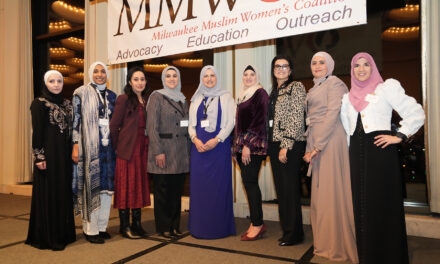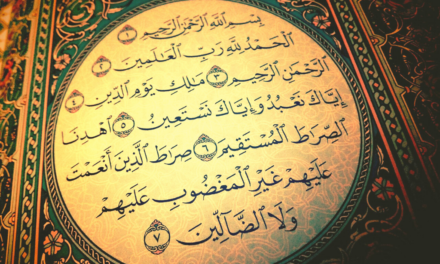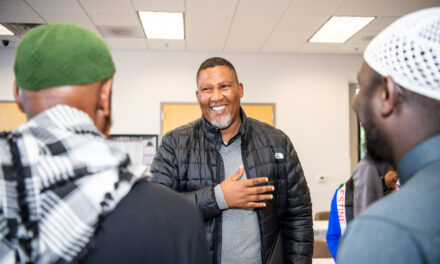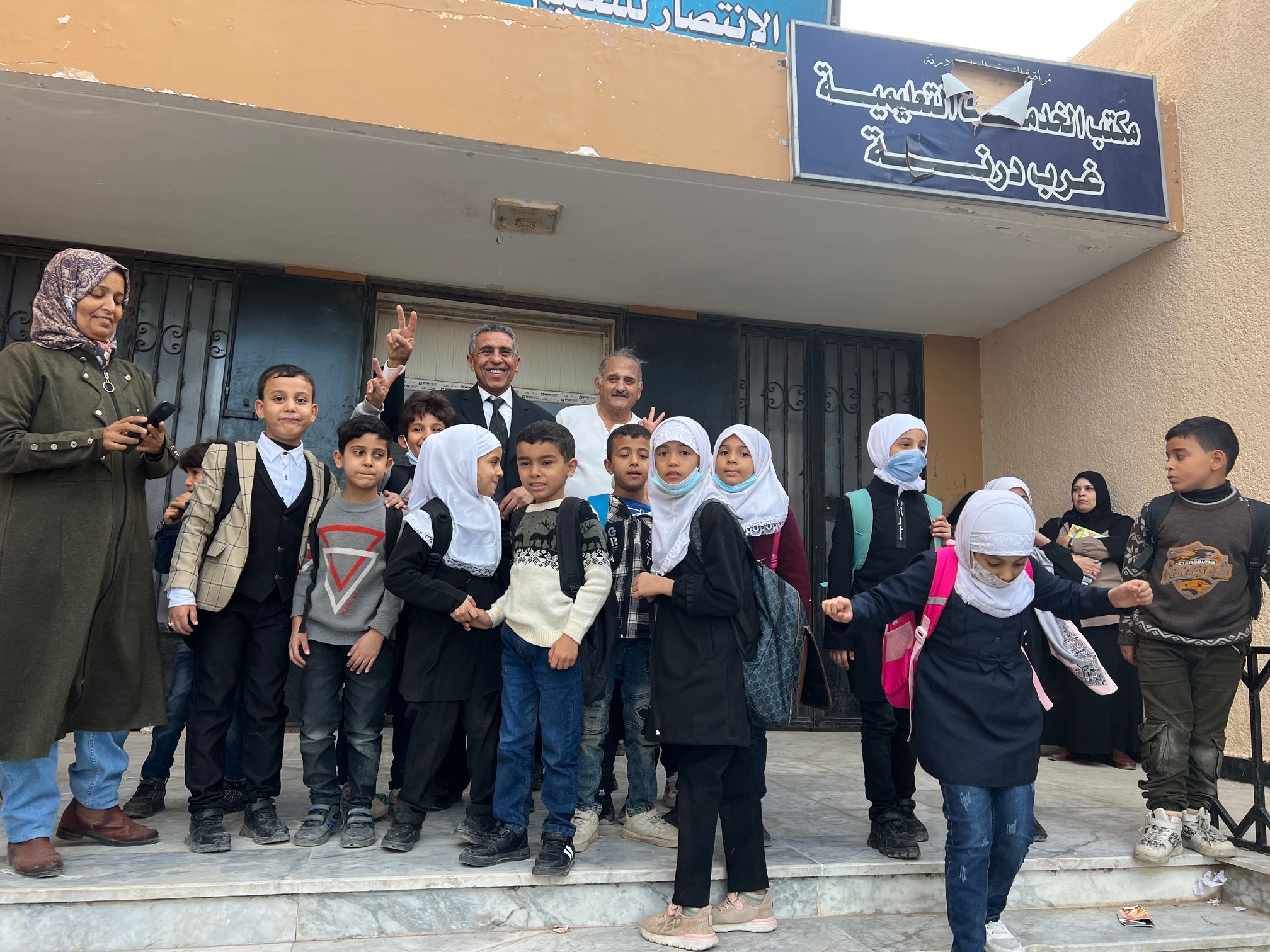
Back row: Ali Hatab (left) of Milwaukee and Kamal Sherkasi (right) of Sacramento, California, spent much of December in Derna, Libya, delivering backpacks, school supplies and coats to children impacted by the destructive September flood.
Photo courtesy of Ali Hatab
A pair of Libyan American community leaders traveled to Derna, a port city in eastern Libya, last month on a personal mission to help victims of September’s devastating flood.
Storm Daniel struck Derna, a city of 100,000 people, Sept. 11 and 12. Two dams broke in the middle of the night and a surge of water decimated a quarter of the city, killing more than 11,000 and displacing more than 40,000, according to a report from the UN Office for the Coordination of Humanitarian Affairs. About 100,000 went missing. Whole families washed out to sea.
Flooding wiped out or damaged infrastructure, hospitals, businesses and schools. A blanket of mud buried homes, businesses and people. Photos of the aftermath of the deadliest and costliest Mediterranean cyclone in recorded history look like Armageddon.
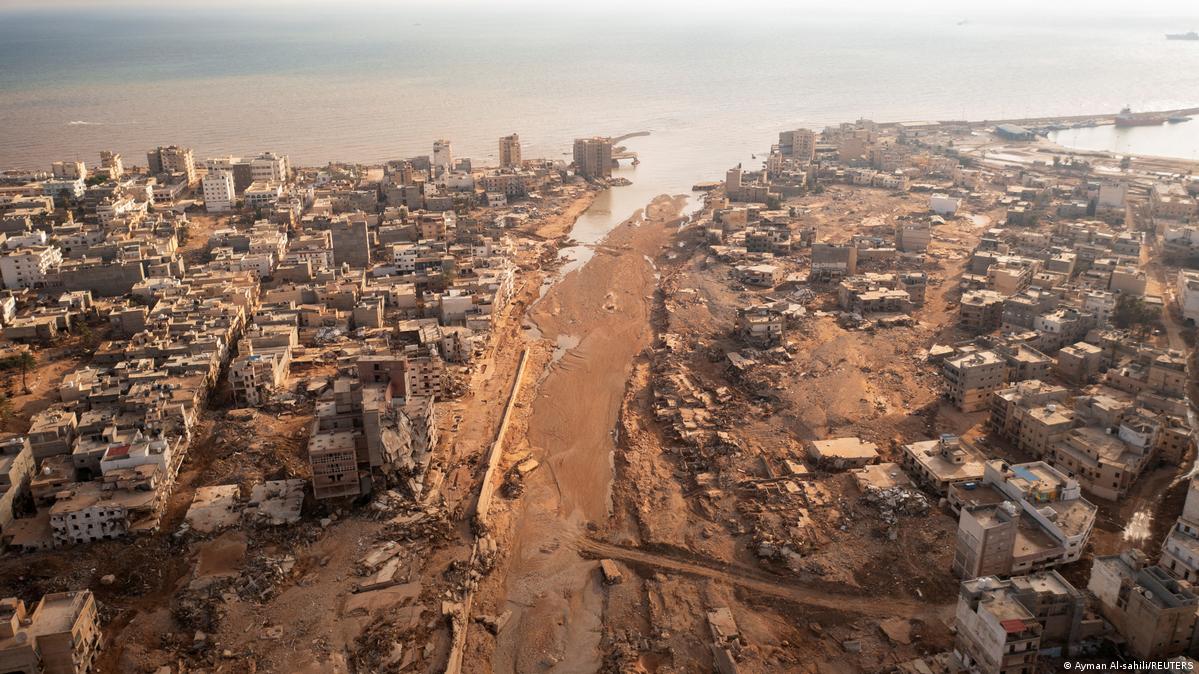
Photo by Ayman Al-sahili of REUTERS
The coastal city of Derna was devastated by flooding that was made up to 50 times more likely due to climate change.
Although the crisis in Libya has fallen from the headlines, “I hope it won’t be forgotten,” said Ali Hatab of Milwaukee, board president of the Libyan American Organization. “Rebuilding will take time and dedicated individuals. It is going to require a sustained effort.”
Hatab and LAO board member Kamal Sherkasi of Sacramento, California, adopted 10 schools in Derna, where they delivered backpacks, school supplies and coats in December to children whose families were impacted by flooding.
Sherkasi paid for the supplies from his personal funds. Hatab and Sherkasi paid their own travel expenses. The LAO is raising funds for what Hatab says will be a long-term effort to help the affected community, but the two men didn’t want to wait to help children, many orphaned by the flood, Hatab said.
For almost three weeks, Hatab and Sherkasi worked with local connections in Benghazi and Derna to find those most in need, purchase supplies and personally deliver them directly to children. Wisconsin Muslim Journal interviewed Hatab and Sherkasi about their project and the conditions they saw in Derna.
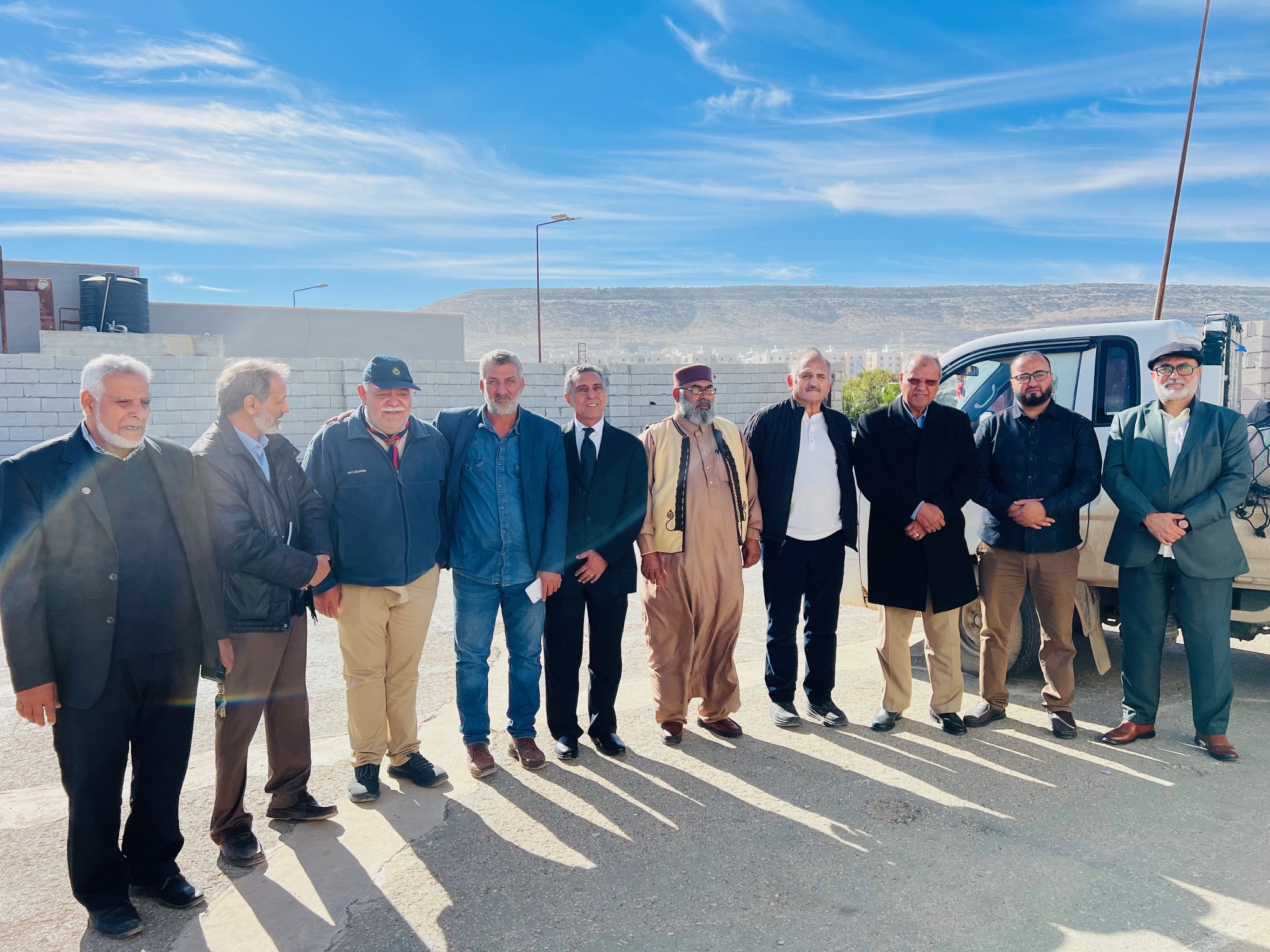
Photo courtesy of Ali Hatab
Ali Hatab (fifth from left) and Kamal Sherkasi (fourth from right) pose with Libyans who helped them fulfill their mission.
Showing children they’re remembered
Hatab and Sherkasi had been talking since October about what they could do to help. Both grew up in Libya and came to the U.S. decades ago for higher education.
Hatab raised a family in Milwaukee, where he built a career in education, serving as a teacher and an assistant principal in Milwaukee Public Schools, and as principal of Hoover Elementary School in West Allis for more than 10 years. Sherkasi earned a degree in civil engineering from California State University, Sacramento. After working as a civil engineer who developed a side business as the owner of soccer specialty stores, 20 years ago he switched careers to go into business full-time. He grew up playing soccer in Libya and is passionate about it, he said.
“First we wanted to send money to charitable organizations that put together baskets of non-perishable food items but we found out they have these coming in,” Sherkasi said. “We thought of blankets and warm clothes but, again, other organizations were donating them.
“How about supplies for kids? When their homes were washed away, those who fortunately, miraculously survived didn’t have anything they needed for going to school.” They checked and learned the need was not being addressed.
“We believe the future of Libya is in its youth,” Sherkasi said. “School supplies are important for education. After we got there, it was cold and windy, so we decided to add jackets.”
Hatab flew out of Chicago and Sherkasi from California to Tripoli, where they met. Two days later they flew to Benghazi, where a friend lives.
“We took a car ride to Derna with an old friend of ours who had lived in the States,” Sherkasi said. “He’s originally from Derna and knows the area very well.”
Their friend helped them obtain the security clearance needed to deliver the school supplies. “They make sure nothing illegal or immoral is being brought in,” he explained.
“Then he drove us to purchase the supplies, which saved shipping fees, and made sure we got into the schools to deliver the supplies, backpacks and jackets.
“One of our conditions was that we wanted to personally deliver them,” he added. “We were going to be present when the kids were given the supplies.”
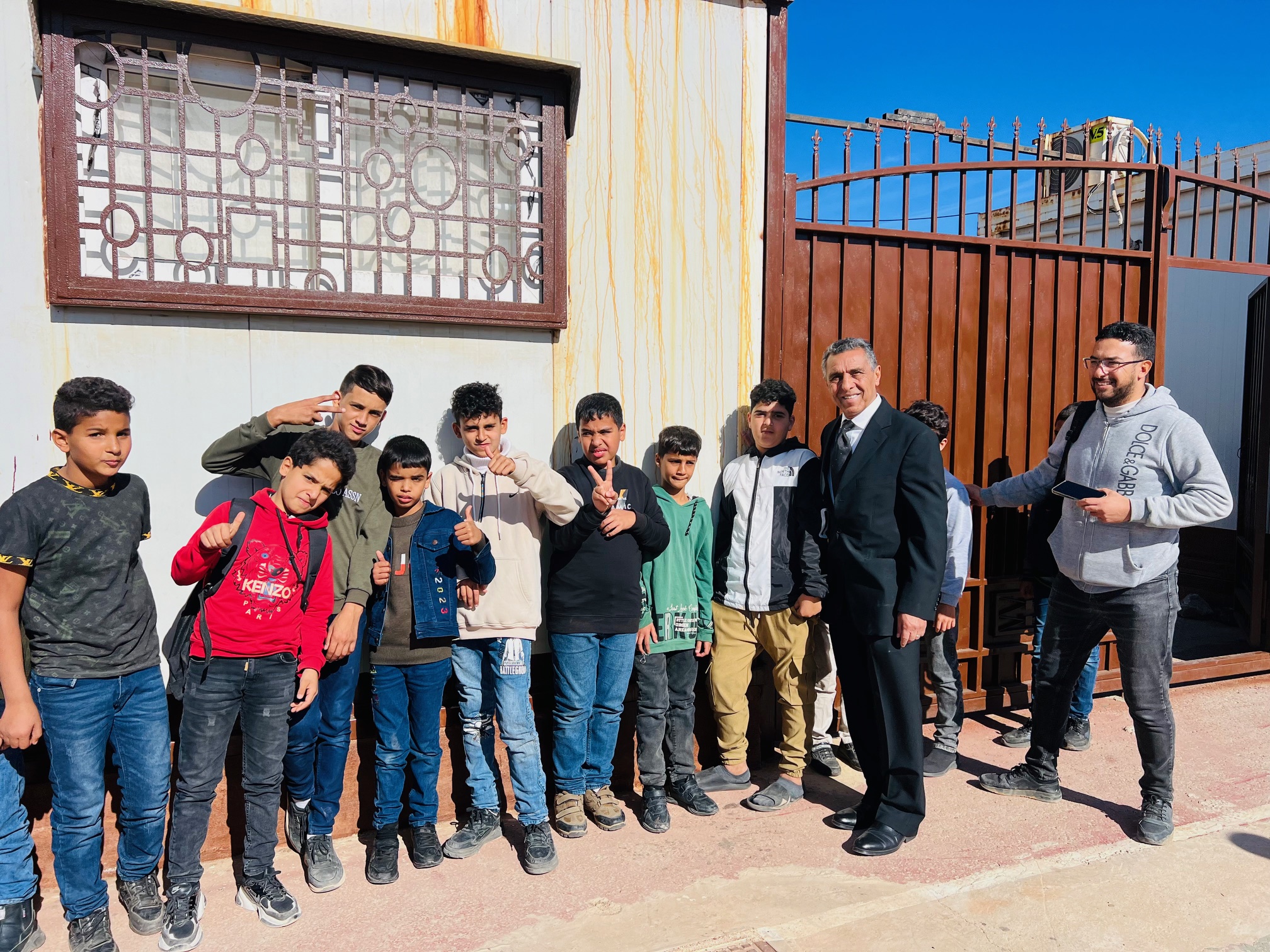
Photo courtesy of Ali Hatab
Ali Hatab (second from right) poses for a photo with school children in Derna.
Sherkasi originally planned to purchase the backpacks and school supplies from China but changed his mind because it would take three months for the container to arrive. Schools started in Libya in mid-November, so “time was of the essence,” he said.
Their friends’ neighbor had a long pick-up truck, so they loaded it up and he joined them on the deliveries.
Their friend, a scout leader, involved boy scouts in packing backpacks. Each backpack contained four pencils, one packet of coloring pencils, a straight edge, two erasers, one pencil sharpener and three types of notebooks (for writing, mathematics and drawing).
A group of local girl scouts also helped. They made signs and set up tables for children to pick up their gifts. One girl scout leader participated throughout the mission, making calls to schools to find out exactly how many were needed of each color, blue for boys and pink for girls.
“Our job was a piece of cake,” Sherkasi said. “Our local friends even made the routes for us. All we had to do was get in and go, hand out things, then go to the next bunch of schools. Everything went much easier than we expected.”
By the time they were done, they delivered 500 backpacks full of supplies plus 800 coats “to the kids who needed them most,” Hatab said.
“It was heartwarming to see the smiles on those kids’ faces and to know people were very happy to see us,” Hatab said. “They were just excited to know the world has been thinking about them and that they’re not isolated, that they’re part of the world.
“One guy was telling me he had a 5-year-old he had been too embarrassed to send to school because he had no money to buy the supplies. We handed him a bag and he said, ‘I promise you my daughter will be enrolled in school tomorrow.’”
“One thing they shared with us,” Sherkasi added, “is that our mere presence, coming all the way from the United States, let them know we feel their pain. Putting a smile on kids’ faces, especially those who lost their loved ones through the flooding, was tremendous.”

Photo courtesy of Ali Hatab
Ali Hatab (back, center) poses with school girls who received backpacks.
Derna’s ongoing crisis
Sandwiched between the major earthquake in Turkey and Syria and the horrific violence in Gaza, the ongoing impacts of the disastrous flood in Derna, Libya, receive little media attention these days.
“It is very unfortunate we live in a world that has so many sad stories,” Hatab said. “Of course, the crisis in Gaza takes precedence over everything else because of the scale of what is happening there but we don’t want to forget the rest. From Kamal and my perspective, we decided we could go to Libya and see what is happening there and how we can help rebuild the country.”
What they saw was a large community still heavily impacted, they said. Clean-up is still going on; not much rebuilding has taken place.
“They have some makeshift roads so people can navigate inside the city because a number of bridges collapsed,” Hatab said. “They are moving a little bit towards normalcy. Stores are opening and people are carrying on with their lives.
“The most fascinating thing I found is that, for all those orphans left behind, the entire community stepped up. Those children were taken to cousins’ houses or aunts or uncles. It was heartwarming to see the way their relatives responded.”
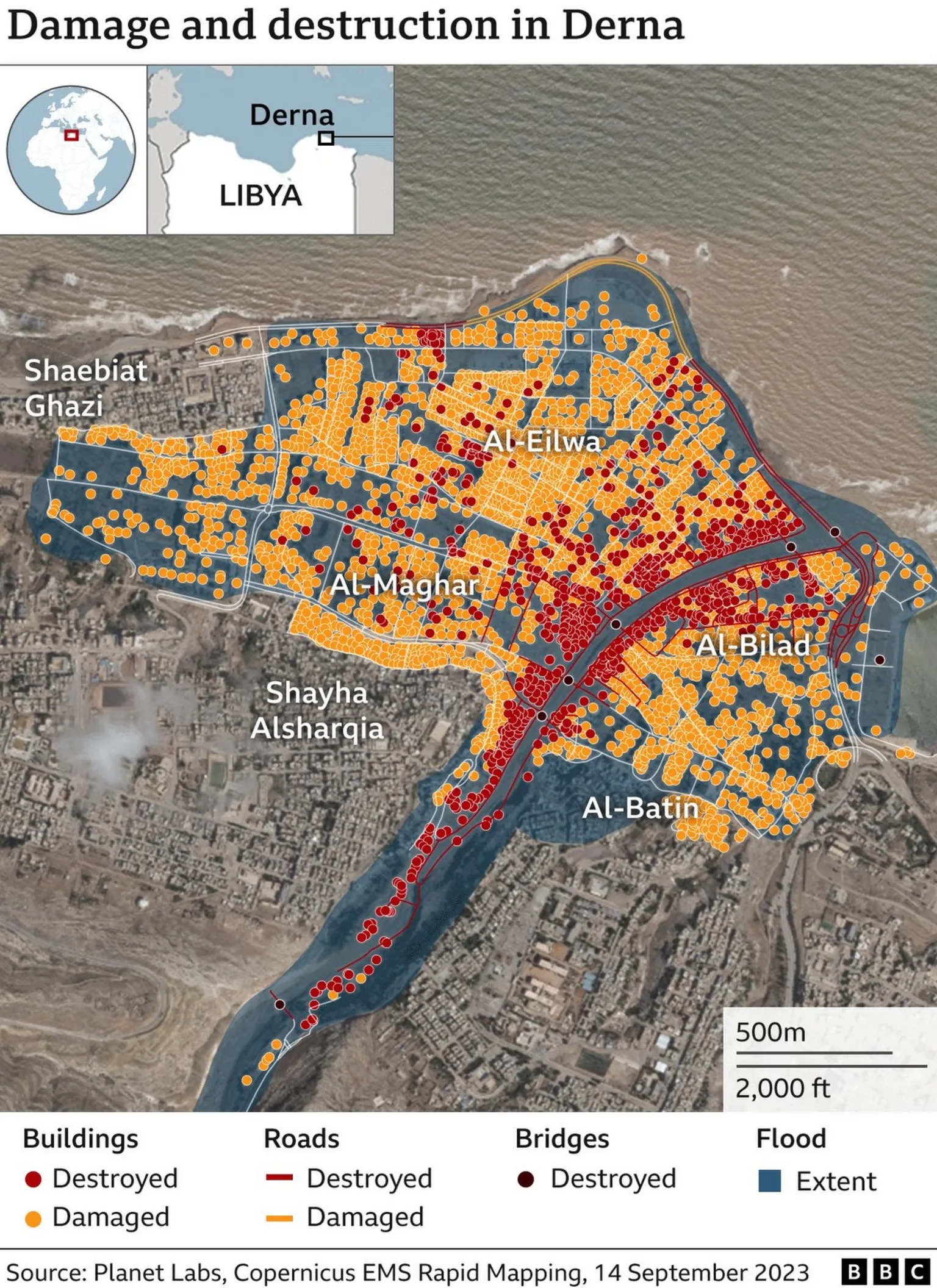
According to a speech by the World Health Organization director general at the end of September, “only a third of hospitals and half of primary health centers remain fully functional due to structural damage to health facilities and hospitals, lack of medicine and medical equipment and shortages of health workers. Affected communities are facing the threat of mosquito – and water-borne diseases, and acute mental distress.
“WHO is working closely with Libya’s Ministry of Health to assess the needs on the ground, provide supplies, and restore primary health care services, especially for routine immunization and mental health,” he stated in the speech.
There is still plenty of rebuilding to do, both Hatab and Sherkasi said. While the government and international organizations are addressing public infrastructure and health care, families and shop owners are responsible for their own properties, they said.
“Our friend pointed to flattened land and said, ‘That used to be all houses,’” Sherkasi said. “They all collapsed. Bridges collapsed. Roads were destroyed.
“All the mud that rushed in is now dry and stuck inside. We saw many people with picks, shovels and wheelbarrows trying to get dried mud out of their homes. It’s going to be a long process, especially if they can’t afford to hire someone. They are relying on family and friends.”
How you can help
“I just hope the story of what happened to Derna continues to be alive among people, especially here in our local communities,” Hatab said. “Rebuilding will not be easy. Hopefully, we can help bring some normalcy back to their lives, especially for children. Hopefully, we can give them that push to go forward.”
The non-profit Libyan American Organization will continue to pursue support for Derna, Hatab said, adding that he is grateful for the big response from members of LAO and others who have rallied to support those impacted. Anyone who would like to contribute to the effort may use this link.
